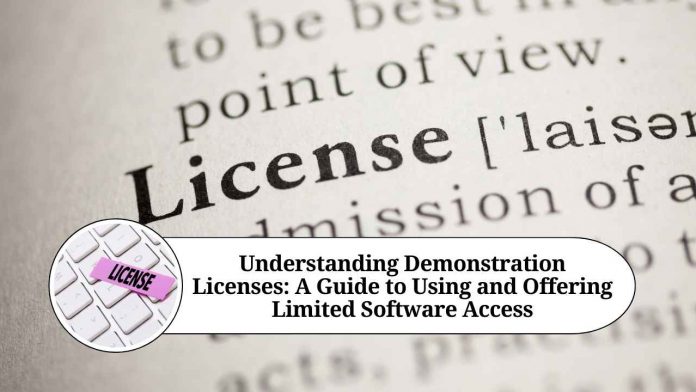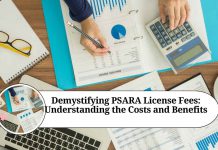Understanding Demonstration Licenses: A Guide for Businesses and Consumers
When it comes to software, demonstration licenses play an essential role in the sales and marketing process. They allow businesses to showcase their products to potential customers and allow consumers to test out software before committing to a purchase. In this blog post, we’ll discuss what a demonstration license is, how it works, and why it’s beneficial for both businesses and consumers.
What is a Demonstration License?
A demonstration license is a type of software license that allows users to access a limited version of a software product for a specified period. It’s typically used to showcase a product’s features and functionalities, allowing potential customers to see how it works before committing to a purchase.
How Does a Demonstration License Work?
A demonstration license usually comes with restrictions on its usage, such as limiting the number of features available, or the amount of data that can be entered. These restrictions are put in place to prevent users from using the software for commercial purposes or to prevent them from taking advantage of the software for extended periods without purchasing a license.
Demonstration licenses can be time-limited or feature-limited, meaning that either the license will expire after a set period, or certain features will be disabled after the license’s expiration.
Why are Demonstration Licenses Beneficial?
Demonstration licenses offer several benefits to both businesses and consumers. Here are some of the advantages:
For Businesses:
- Attract potential customers: Demonstration licenses allow businesses to showcase their products and attract potential customers. This way, businesses can build a relationship with potential customers and offer them a taste of what they offer before making a purchase.
- Increase Sales: Demonstrations licenses help to increase sales by allowing users to test the software before making a purchase. This way, customers can make informed decisions and be confident in their purchase.
- Reduce the risk of returns: By allowing potential customers to test the software beforehand, businesses can reduce the risk of returns, as customers have a better understanding of the software’s features and limitations.
For Consumers:
- Test Before Purchase: Demonstration licenses allow consumers to test the software before committing to a purchase. This way, they can determine if the software is suitable for their needs and meets their requirements.
- Save Money: Demonstration licenses are typically free or offered at a reduced price, allowing consumers to save money while testing out software.
- Build Trust: By offering demonstration licenses, businesses build trust with potential customers, allowing consumers to see what they offer and making informed decisions about their purchases.
- Trial Licenses: These licenses allow users to access the full version of the software for a limited period, usually 30-90 days. During this time, users can test all the features and functionalities of the software.
- Limited Feature Licenses: These licenses allow users to access only a limited number of features or functionalities of the software. This way, users can get a taste of what the software offers without being overwhelmed with all the features.
- Limited Data Licenses: These licenses restrict the amount of data that can be entered into the software. This is commonly used for software that requires data input, such as accounting software or project management software.
- Cloud-Based Licenses: These licenses allow users to access the software through a cloud-based platform. This is useful for software that requires a specific hardware or software configuration that the user may not have access to.
When businesses offer demonstration licenses, they typically require users to provide their contact information, such as their name, email address, and phone number. This allows businesses to follow up with potential customers and offer them more information about the software, pricing options, and any special offers or promotions.
Demonstration licenses also help businesses gather valuable feedback from users, which they can use to improve their products. This feedback can help businesses identify bugs, usability issues, and other areas for improvement.
Conclusion
In conclusion, demonstration licenses are an important aspect of the software industry that benefit both businesses and consumers. They allow businesses to showcase their products to potential customers, increase sales, and gather valuable feedback, while also allowing consumers to test the software before committing to a purchase, save money, and make informed decisions.
Read more useful content:
Frequently Asked Questions (FAQs)
What is a demonstration license?
A demonstration license is a type of software license that allows users to access a limited version of a software product for a specified period.
Why do businesses offer demonstration licenses?
Businesses offer demonstration licenses to showcase their products to potential customers, increase sales, and reduce the risk of returns.
What types of demonstration licenses are available?
There are different types of demonstration licenses available, including trial licenses, limited feature licenses, limited data licenses, and cloud-based licenses.
How long do demonstration licenses typically last?
Demonstration licenses can last anywhere from a few days to several months, depending on the type of license and the software product.
Can users upgrade from a demonstration license to a full license?
Yes, users can typically upgrade from a demonstration license to a full license if they decide to purchase the software.
Are demonstration licenses free?
Demonstration licenses can be free or offered at a reduced price, depending on the software product and the business offering the license.
Can users access customer support during a demonstration license period?
Yes, users can typically access customer support during a demonstration license period, although the level of support may be limited.
What happens when a demonstration license expires?
When a demonstration license expires, the user may no longer be able to access the software or certain features and functionalities may be disabled.
Can users share their demonstration license with others?
No, demonstration licenses are typically non-transferable and can only be used by the person who registered for the license.
What happens if a user violates the terms of a demonstration license?
If a user violates the terms of a demonstration license, the business offering the license may revoke the license and take legal action, depending on the severity of the violation.




















